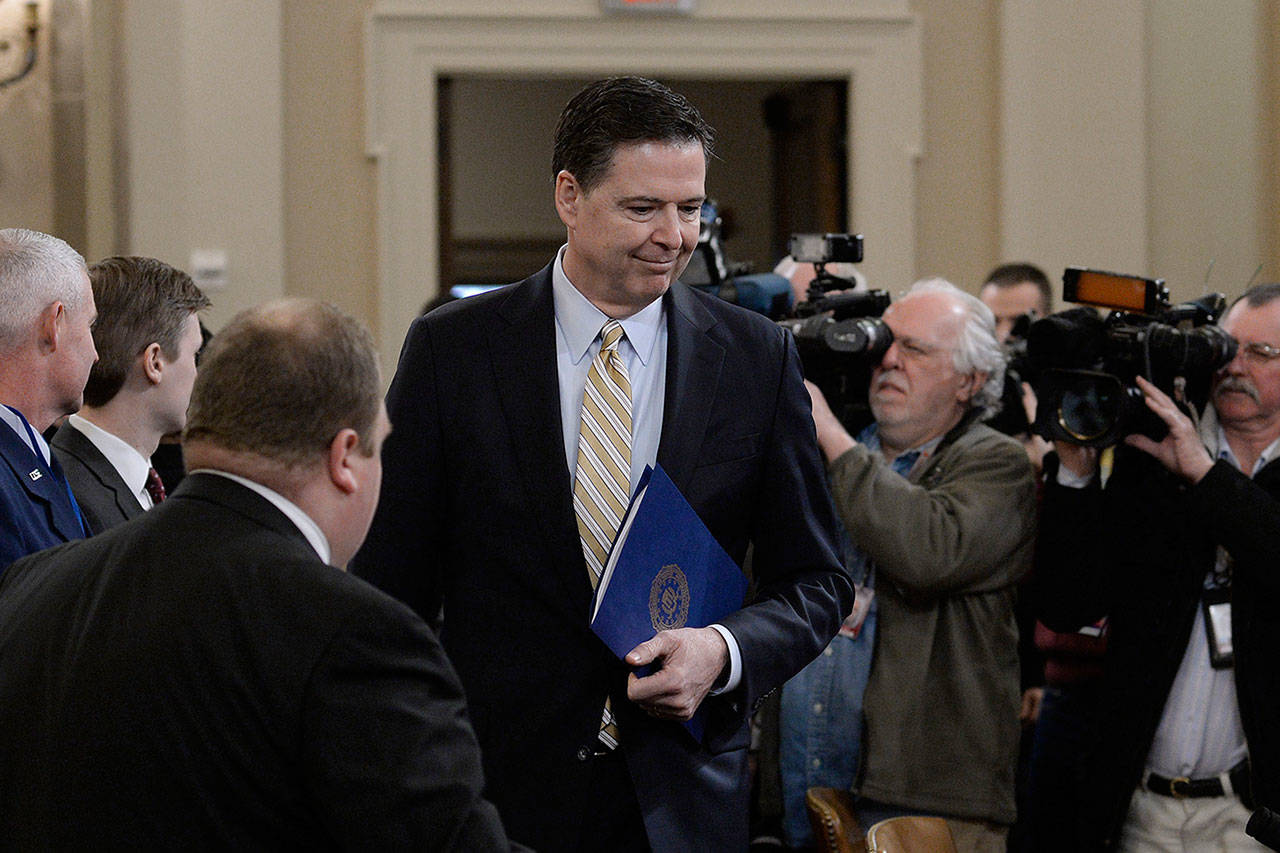WASHINGTON, D.C. — In an acknowledgment that is likely to hobble the fledgling Trump administration for months, if not years, FBI Director James Comey on Monday confirmed for the first time that his agency is investigating possible collusion between advisers to President Donald Trump’s election campaign and Russia.
At a rare public hearing of the House Intelligence Committee, Comey said it was unusual for his agency to confirm the existence of an ongoing investigation. But, he said, Justice Department guidelines allow such a revelation “where it is in the public interest.”
“This is one of those circumstances,” he said.
Comey said there is no “usual” length of time for a counterintelligence investigation but that this one began in July and would be considered “quite young” — a timeline that suggested, at a minimum, that it would distract for months, if not years, from Trump’s policy priorities.
Some see the investigation as a no-win situation for Trump. If his supporters are indicted, he will face further questions about what he knew. If they aren’t indicted, critics will accuse the Trump administration of letting the president’s allies escape charges.
Republican Rep. Devin Nunes of California, the committee chairman and a Trump campaign adviser, urged Comey to complete his investigation as quickly as possible.
“This work is very complex and there is no way for me to give you a timetable as to when it will be done,” Comey said.
Certainly, confirmation of the FBI investigation promises to keep alive the controversy over possible links between Trump and Russia for months in a city where the probe already is being compared to the Watergate scandal, which unfolded over two years before President Richard Nixon resigned 43 years ago.
Trump fired his first national security adviser, retired Lt. Gen. Michael Flynn, over his contacts with Russian Ambassador Sergey Kislyak, and his attorney general, Jeff Sessions, was forced to recuse himself from oversight of the FBI investigation because of his contacts with Kislyak. Both the House and Senate Intelligence committees are conducting public probes, and the House Oversight Committee also is probing Flynn’s role in the Trump administration. The FBI probe marks a fourth investigation.
“I have been authorized by the Department of Justice to confirm that the FBI, as part of our counterintelligence mission, is investigating the Russian government’s efforts to interfere in the 2016 presidential election and that includes investigating the nature of any links between individuals associated with the Trump campaign and the Russian government and whether there was any coordination between the campaign and Russia’s efforts,” Comey said. “As with any counterintelligence investigation, this will also include an assessment of whether any crimes were committed.”
Four-hour hearing
Comey’s announcement came at the beginning of a hearing that lasted more than four hours. It included an unprecedented back and forth between the witnesses and Trump, who used his official @POTUS Twitter account to comment on the hearing. At one point, Comey responded to a Trump tweet that “the NSA and FBI tell Congress that Russia did not influence electoral process” by denying that an intelligence community report had reached that conclusion.
Republicans and Democrats showed themselves to be sharply divided on the major issues to be probed. While Democrats’ questions aimed primarily at determining what the FBI knew about contacts between Russia and several Trump campaign officials, Republicans primarily asked about what laws could be brought to bear against officials who had leaked information to news reporters.
At one point, South Carolina’s Rep. Trey Gowdy suggested that reporters could be jailed under the Espionage Act for publishing details of Flynn’s conversations with Kislyak. Comey responded by saying he knew of no plans to prosecute reporters.
Classified material
The hearing also featured Adm. Mike Rogers, director of the National Security Agency, and included long stretches when Comey and Rogers insisted that rules governing classified material made it impossible for them to discuss many topics, including whether specific individuals were under investigation.
At one point, Comey refused to say who was present when he briefed then President-elect Trump on an opposition research dossier that had suggested Trump was vulnerable to Russian blackmail. Comey said he could not answer the question because he did not want to confirm that a classified conversation with the president-elect had taken place.
Still, the hearing offered some concrete information.
Both Comey and Rogers agreed that there was “no information to support” the president’s accusation in a tweet two weeks ago that President Barack Obama had ordered Trump’s phones tapped.
“With respect to the president’s tweets about alleged wiretapping directed at him by the prior administration, I have no information that supports those tweets and we have looked carefully inside the FBI,” Comey said. “The Department of Justice has asked me to share with you that the answer is the same for the Department of Justice and all its components. The department has no information that supports those tweets.”
Rogers later said he had “seen nothing from the NSA side that we engaged in any such activity.”
The two officials also confirmed that their organizations had found no evidence that Russian hackers had changed vote totals in any state.
Russians were “loud”
They acknowledged puzzlement at why the Russian intervention in the 2016 election cycle had been so “loud,” with little effort to hide its hacking of the Democratic National Committee or the emails of Hillary Clinton campaign Chairman John Podesta. Comey suggested that the Russians wanted people to know their capabilities “to freak us out” and undermine confidence in the democratic process.
The committee has scheduled a second public hearing for March 28, where the witnesses are expected to include Obama’s director of national intelligence, James Clapper, and Sally Yates, who was the acting U.S. attorney general who was fired by Trump for refusing to back his travel ban on some Muslim-majority countries. Yates reportedly warned the Trump team that Flynn could be blackmailed because of his communications with Kislyak.
———
(Anita Kumar contributed to this report.)


